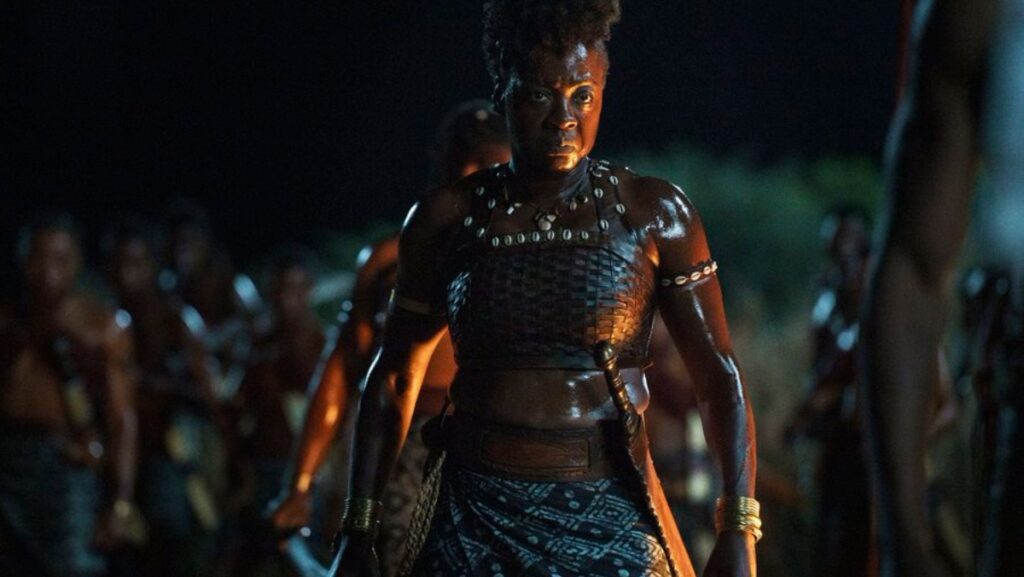The Woman King is taking the world by storm with its powerful narrative about the Agojie, an all-woman warrior army in the Kingdom of Dahomey during the 1800s. There’s a lot of love about this movie, from its centering of Black women who shifted history to its incredible cast and action sequences. But, long before Viola Davis took to the screen as Nanisca, The Woman King was simply an idea that needed to find the right mix of visionaries to bring it to fruition. Nerdist spoke with producer Cathy Schulman and the legendary director Gina Prince-Bythewood about bringing The Woman King to reality.
The birth of The Woman King stems back to a 2015 conversation with Schulman’s collaborative partner and friend Maria Bello. “[She] went on a trip to Benin, which is modern day Dahomey and she learned about the Agojie warriors,” Schulman said. “And she came back from the trip and told me the story and said, ‘Wouldn’t it be amazing to make a movie about the most successful and first all-female army ever in the world?’ And at first I didn’t even believe it was true. I didn’t understand how an army could be all-female… the more that we researched, which was mostly done through French books because most of the research materials were coming out of the European gaze, which was an issue in itself, we had to sort of shift the gaze to make sure we were coming from the point of view of the Dahomey people themselves.”
Bello and Schulman found an intriguing period of time during the Kingdom of Dahomey’s history where they were clashing with the Oyo nation. This took place during a pivotal era when the mighty kingdom was reevaluating its involvement in slavery. So, that’s what led to The Woman King’s story. Of course, Schulman knew she needed to find Black women to take the reins on crafting and directing this narrative. That’s where Gina Prince-Bythewood comes in. The film director and screenwriter is known for her work on Love & Basketball, The Secret Life of Bees, The Old Guard, and Cloak & Dagger.
She brings in her signature eye and, along with cinematographer Polly Morgan, creates some incredibly epic fight scenes within this rich and visually stunning world. Bythewood wasn’t familiar with Morgan’s work prior to The Woman King; however, she made it clear what she wanted this film to look like. “Honestly, my dictate was I want our women to look more beautiful than they’ve ever had on film,” Prince-Bythewood affirmed. “And [Morgan] took that personally and wanted to do that, too. This is also a big epic film with lots of scope. I wanted to give that to [Black women] as well. We deserve that type of bigness… And we just sat and we watched some of our favorite films like Braveheart and Last of the Mohicans and Gladiator. And seeing that bigness and that scope and that beauty, I wanted that for us.”
However, Gina Prince-Bythewood knew that scenes in The Woman King would look different from those famous films. This time, it’s not men battling against other men. It’s women fighting men and gaining the upper hand, which requires a new perspective.
“Our incredible fight coordinator, stunt coordinator, Danny Hernandez, is brilliant,” said Prince-Bythewood. “And we just had so many great conversations, which always started with character. Who are these characters? How do they fight? Nanisca should fight differently than Izogie, and they fight differently than Nawi…we wanted to abolish [thinking that] you can only be a warrior if you’re six feet tall. We have all different shapes and sizes. And again, how do we make that look really beautiful in the way that they’re fighting? How do they fight together as a sisterhood? It always started with story, always started with character. [And] I’m not cutting around stunt doubles. So put in the work, which [the cast] all did.”
And that work shines brightly in The Woman King. (Seriously, check out our review to see how much we love this film.) It’s what happens when an idea is executed by putting the right people in specific places where their expertise and passion can shine.
The Woman King is currently in theaters.

